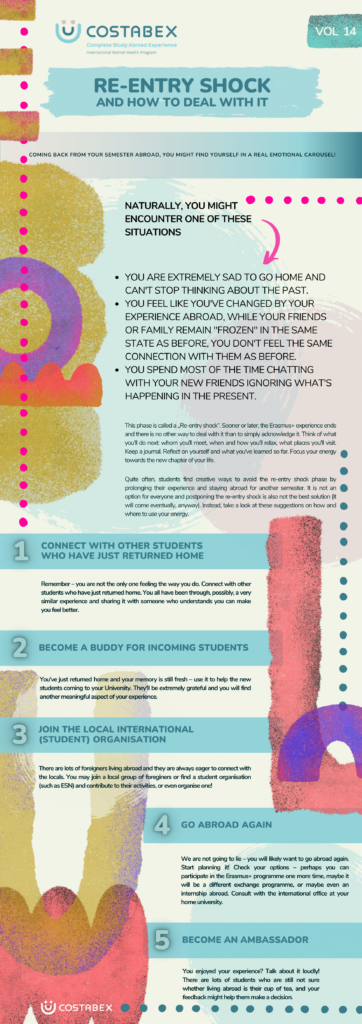Coming back from your semester abroad, you might find yourself in a real emotional carousel!
Naturally, you might encounter one of these situations:
- You are extremely sad to go home and can‘t stop thinking about the past
- You feel like you‘ve changed by your experience abroad, while your friends or family remain „frozen“ in the same state as before, you don‘t feel the same connection with them as before
- You spend most of the time chatting with your new friends ignoring what‘s happening in the present
This phase is called a „Re-entry shock“. Sooner or later, the Erasmus+ experience ends and there is no other way to deal with it than to simply acknowledge it. Think of what you‘ll do next: whom you‘ll meet, when and how you‘ll relax, what places you‘ll visit. Keep a journal. Reflect on yourself and what you‘ve learned so far. Focus your energy towards the new chapter of your life.
Quite often, students find creative ways to avoid the re-entry shock phase by prolonging their experience and staying abroad for another semester. It is not an option for everyone and postponing the re-entry shock is also not the best solution (it will come eventually, anyway). Instead, take a look at these suggestions on how and where to use your energy.
- Connect with other students who have just returned home
Remember – you are not the only one feeling the way you do. Connect with other students who have just returned home. You all have been through, possibly, a very similar experience and sharing it with someone who understands you can make you feel better.
- Become a buddy for incoming students
You‘ve just returned home and your memory is still fresh – use it to help the new students coming to your University. They‘ll be extremely grateful and you will find another meaningful aspect of your experience.
- Join the local international (student) organisation
There are lots of foreigners living abroad and they are always eager to connect with the locals. You may join a local group of foreginers or find a student organisation (such as ESN) and contribute to their activities, or even organise one!
- Go abroad again
We are not going to lie – you will likely want to go abroad again. Start planning it! Check your options – perhaps you can participate in the Erasmus+ programme one more time, maybe it will be a different exchange programme, or maybe even an internship abroad. Consult with the international office at your home university.
- Become an Ambassador
You enjoyed your experience? Talk about it loudly! There are lots of students who are still not sure whether living abroad is their cup of tea, and your feedback might help them make a decision.
Useful resources:
https://erasmus-plus.ec.europa.eu/opportunities/opportunities-for-individuals/students

